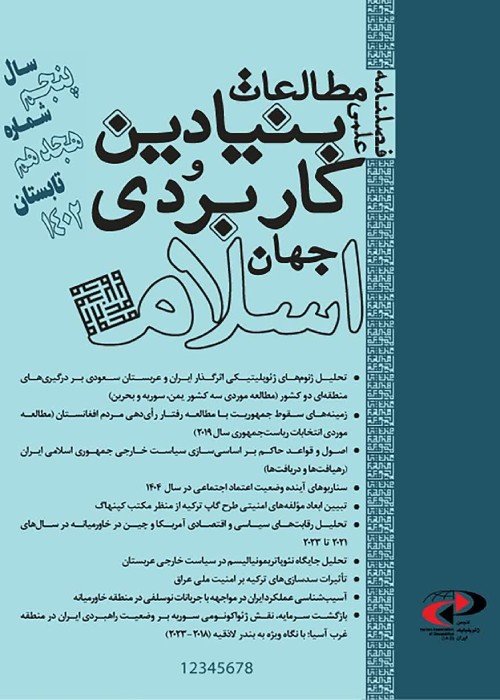Investigating the Long-Term Economic Impact of Personal Remittances ،Official Development Assistance and Foreign Direct Investment in Selected Islamic Countries
Islamic countries, like other countries, need economic growth to achieve a level of prosperity.Most developing countries face a shortage of resources to achieve economic growth and development. Therefore, in these countries, the flow of various types of foreign investment is of considerable importance. The purpose of this study was to investigate the long-term impact of foreign capital inflows, including FDI foreign direct investment, ODA Official development assistance, and the personal remittances of PR entities on economic growth. selected Islamic countries countries (Azerbaijan, Bangladesh, Benin,Cameroon, Ajibat, Indonesia, Iran,Jordan, Kazakhstan, Marco, Niger, Nigeria, Pakistan, Sudan, Turkey, Tunisia and Uganda) during the period 2000-2019. the model of this research is estimated after the tests using the panel econometric method of fully modified least squares. the results show that in the long run the flow of foreign capital (official development assistance, foreign direct investment and personal remittances) has a positive effect. And has a significant impact on the real gdp of these countries. also, the variables of labor, capital and government expenditures have a positive and significant effect on economic growth. therefore, economic policymakers for economic prosperity should consider policies to develop the business environment, the optimal use of foreign resources in the development of infrastructure and directing the resources of nationals living abroad to improve national infrastructure and economic indicators.
Given that economic growth is considered a necessity to ensure the well-being of societies, countries are always striving to achieve their desired economic growth, which has its own conditions for achieving economic growth in each country. One of the factors to achieve economic growth is having sufficient resources. Islamic countries, including developing countries, are also facing a shortage of sufficient resources, and to solve this problem, they need a variety of foreign investments. Therefore, the purpose of this study was to investigate the effect of foreign investment (foreign direct investment, personal transfer income and official development assistance) on the economic growth of 17 selected Islamic countries during the period 2000 to 2019 using the FMOLS econometric method (fully modified least squares). ) In Eviews10 software.
In order to be static and there is a long-term relationship between dependent and independent variables, unit root test (Phillips-Prone) and cumulative test (Cao) have been used. The variables are left with a 99% probability level and in the cohesion test with a 99% probability level, the relationship between the variables is long-term. To determine the nature of the test and the effects of width from the source of observations in the model estimation, Aflimer and Hausmann tests were performed. The model of this research was performed after the tests by panel method (at least completely reconstructed squares) with fixed effects. The results of this model show that the variables of capital, labor, personal transfer revenues, foreign direct investment, official development assistance and government expenditures with coefficients (0.034, 0.658, 0.286, 0.037, 0.0522, 0.427) on the economic growth of 17 selected countries, respectively. Islam has a positive and significant effect. As seen in the theoretical foundations and research background in different countries, the inflow of various types of foreign capital, if the optimal conditions for their use exist in the host country and are used in the construction and infrastructure sectors, will lead to economic growth. Also, the use of different types of foreign capital varies from country to country. If foreign direct investment is used according to the conditions of the same country, it can lead to the transfer of advanced technology, increase exports and economic growth and development. Personal transfer revenues increase foreign exchange reserves and, if invested in production, lead to lower inflation and economic growth. Formal development assistance provided to governments to reduce poverty, which, if used in the field of development, will contribute to economic growth. This study is in line with the study of Mohammad Molaei (1397). In order to effectively influence foreign investment and accelerate its entry into countries, it is necessary to ensure political stability and economic security, including the improvement of infrastructure, the establishment and implementation of appropriate laws and regulations.
- Pay serious attention to economic policies to increase the ratio of physical capital to labor force to increase productivity. Policymakers must pay close attention to the implementation of laws and the management system, to reduce corruption and not allow the lack of oversight to waste resources on foreign aid. Also strengthening the business environment, especially the removal of legal, political and international trade restrictions and the adoption of open economic policies will strengthen economic growth. It is suggested that the inflow of foreign capital be spent on the national interests of countries and economic and social goals to reduce corruption, poverty, inequality and foreign debt in the medium and long term. Recipients of formal development aid must provide the necessary conditions for the use of this aid in profitable activities in order to promote economic growth and development. Otherwise, the aid will be spent only on unnecessary military expenditures and the import of luxury and consumer goods. In order to positively affect the inflows of foreign direct investment on economic growth, serious attention should be paid to facilities and the expansion of financial systems and the cohesion of monetary and financial markets, the reduction of barriers and restrictions, and the strengthening of communication technologies
- حق عضویت دریافتی صرف حمایت از نشریات عضو و نگهداری، تکمیل و توسعه مگیران میشود.
- پرداخت حق اشتراک و دانلود مقالات اجازه بازنشر آن در سایر رسانههای چاپی و دیجیتال را به کاربر نمیدهد.


